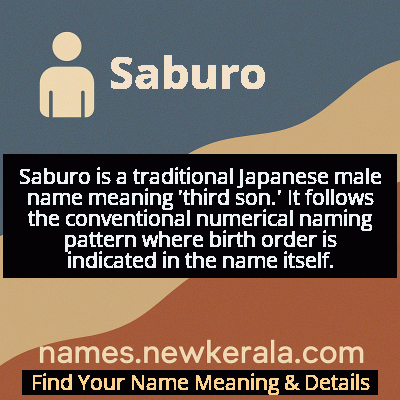Saburo Name Meaning & Details
Origin, Popularity, Numerology Analysis & Name Meaning of Saburo
Discover the origin, meaning, and cultural significance of the name SABURO. Delve into its historical roots and explore the lasting impact it has had on communities and traditions.
Name
Saburo
Gender
Male
Origin
Japanese
Lucky Number
4
Meaning of the Name - Saburo
Saburo is a traditional Japanese male name meaning 'third son.' It follows the conventional numerical naming pattern where birth order is indicated in the name itself.
Saburo - Complete Numerology Analysis
Your Numerology Number
Based on Pythagorean Numerology System
Ruling Planet
Uranus (Rahu)
Positive Nature
Strong sense of order, loyal, practical, and disciplined.
Negative Traits
Stubborn, overly serious, rigid, and prone to feeling restricted.
Lucky Colours
Blue, gray.
Lucky Days
Saturday.
Lucky Stones
Blue sapphire.
Harmony Numbers
1, 7, 8.
Best Suited Professions
Managers, engineers, accountants, organizers.
What People Like About You
Dependability, discipline, practicality.
Famous People Named Saburo
Saburo Teshigawara
Choreographer and Dancer
Internationally acclaimed butoh dancer and founder of Karas company
Saburo Ienaga
Historian and Educator
Renowned for his textbook lawsuits against the Japanese government regarding historical accuracy
Saburo Sakai
Military Pilot
Famous Japanese naval aviator and flying ace with 64 confirmed victories
Saburo Kawabuchi
Football Executive
Former J.League chairman and key figure in Japanese football development
Name Variations & International Equivalents
Click on blue names to explore their detailed meanings. Gray names with will be available soon.
Cultural & Historical Significance
During the Edo period, this naming convention became widespread among both samurai and commoner classes, solidifying its place in Japanese cultural identity. The name carries echoes of Japan's feudal past while maintaining relevance in modern times as a connection to traditional values and family heritage. In literature and folklore, third sons named Saburo often appear as protagonists who succeed through cleverness and perseverance rather than birthright, reflecting cultural narratives about merit and character overcoming predetermined social positions.
Extended Personality Analysis
Individuals named Saburo are often perceived as embodying the traditional characteristics associated with third sons in Japanese culture - they tend to be adaptable, cooperative, and team-oriented. Having grown up in a position that typically required compromise and finding one's place within family dynamics, Saburos often develop strong diplomatic skills and the ability to mediate conflicts. They are frequently seen as reliable supporters rather than leaders, possessing a practical mindset and good problem-solving abilities.
Many Saburos exhibit a balanced approach to life, combining traditional values with modern adaptability, and they often excel in roles that require patience, persistence, and the ability to work well with others. Their personality is frequently characterized by a quiet confidence rather than overt ambition, making them valued team members and trusted colleagues in professional settings. This alignment with traditional expectations doesn't necessarily limit their individuality, but rather provides a foundation from which they can develop unique strengths and perspectives that serve them well in both personal and professional contexts.
Modern Usage & Popularity
In contemporary Japan, Saburo continues to be used, though less frequently than in previous generations as Western names gain popularity. The name maintains a traditional, somewhat nostalgic quality and is often chosen by parents seeking to honor family heritage or cultural traditions. While not among the top 100 most popular names for newborns in recent years, it remains recognizable and respected. Many middle-aged and older Japanese men bear this name, and it occasionally appears in younger generations when families wish to continue naming traditions. The name has also gained some international recognition through Japanese diaspora communities and cultural exports, though it remains distinctly Japanese in character and association. Its usage trends reflect a broader pattern where traditional numerical names are becoming less common but still valued for their cultural significance.
Symbolic & Spiritual Meanings
Symbolically, Saburo represents the concept of balance and mediation within family and social structures. As the third son, it embodies the idea of finding one's unique path while maintaining family connections - neither the burden of leadership carried by first sons nor the freedom often afforded to youngest children. The number three in Japanese symbolism represents harmony, creativity, and the resolution of duality, making Saburo a name that suggests bridge-building and diplomatic qualities. It also symbolizes tradition, continuity, and the importance of knowing one's place within larger systems. The name carries connotations of reliability, perseverance, and the wisdom that comes from observing and learning from others' experiences rather than being in the spotlight. This symbolic meaning extends beyond mere birth order to represent a philosophical approach to life that values harmony, adaptation, and finding strength in supportive roles.

